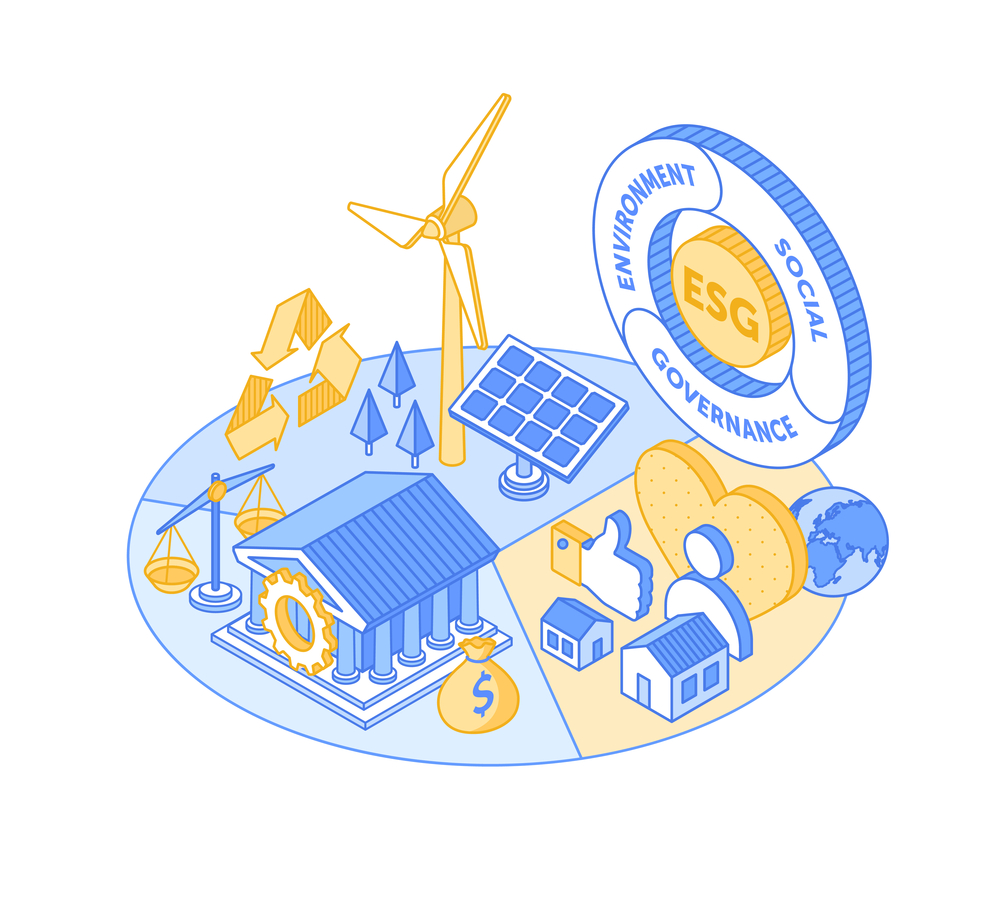Our PM sheds more light on ESG in the Budget 2025. Still, no legislation to compel SMEs to be compliant. Yet we can see that the carrot is out with the Women’s Empowerment to increase Women in high position, Waste Management, and reverse AI Vending Machine. At the same time, sticks being the Carbon Tax.
As sustainability becomes an increasingly important consideration for businesses, the Environmental, Social, and Governance (ESG) concept has emerged as a crucial pathway to long-term success. Auditors who are servicing the SME start to venture into studying more about ESG. Let us go deeper into answering the what and why of ESG.
ESG factors encompass a range of issues, including a company’s environmental impact, social responsibility, and corporate governance practices. In today’s article, we delve into the importance of ESG and how it can drive sustainable growth for businesses.
Embracing ESG goes beyond mere compliance; it demonstrates a commitment to creating a positive impact on the environment, society, and stakeholders. Companies that prioritize ESG factors contribute to a more sustainable future and can enhance their financial performance and attract investors who prioritize responsible investing.
From reducing carbon emissions to promoting diversity and ethical business practices, organizations that integrate ESG principles into their strategies can create value and differentiate themselves in the market. Join us as we unveil the growing significance of ESG and explore how it can be a catalyst for sustainable growth in today’s rapidly evolving business landscape.

The three pillars of ESG – Environmental, Social, and Governance
The ESG framework is built upon three fundamental pillars: Environmental, Social, and Governance. Each of these components plays a pivotal role in shaping the overall sustainability and ethical standards of a business.
The Environmental aspect focuses on how a company interacts with the natural world, including its efforts to minimize carbon emissions, manage waste, and utilize resources sustainably. Companies are increasingly recognizing that their operational decisions can significantly impact climate change and biodiversity, thereby necessitating a proactive approach to environmental stewardship. This includes adopting renewable energy sources, implementing energy efficiency measures, and striving for a reduced environmental footprint.
The Social pillar received the least attention. Some would akin this to the CSR (Corporate Social Responsibility) we have long been very familiar with, yet this is very far away from the truth. Since CSR is only a fragment of the Social pillar.
The social pillar examines a company’s relationships with its employees, customers, suppliers, and the communities in which it operates. This dimension encompasses various issues, including labor practices, diversity and inclusion, human rights, and community engagement. Businesses prioritising social responsibility are more likely to foster a positive workplace culture, enhance employee morale, and build strong community ties. A socially responsible approach strengthens a company’s reputation and drives customer loyalty, as consumers increasingly prefer supporting organizations that align with their values.
Governance encompasses the structures, practices, and policies that dictate how a company is directed and controlled. This pillar includes considerations such as board diversity, executive compensation, shareholder rights, and transparency in reporting. Strong governance practices are essential for ensuring accountability, ethical behaviour, and long-term strategic planning. Companies that adhere to high governance standards are better equipped to manage risks, respond to stakeholder concerns, and navigate regulatory requirements. Together, the three pillars of ESG create a comprehensive framework that helps organizations assess their impact and drive meaningful change.

What’s the importance of ESG to businesses?
The importance of ESG in the corporate landscape cannot be overstated. Increasingly, investors seek companies that demonstrate a commitment to sustainable practices and responsible governance. Frankly, who doesn’t want a company that not only generates good returns simultaneously but can do so in the long run, as perpetual as possible? This shift is driven by a growing awareness of the risks associated with climate change, social inequality, and poor governance.
As a result, businesses that prioritise ESG factors are more likely to attract investment and secure favourable funding. Malaysia ESG is still in an early adopter phase, especially in the SME arena, with lots of just paper-ESG approaches among the Bursa Listed companies. Investors recognise that companies with robust ESG practices are often better positioned for long-term success, as they are able to mitigate risks and capitalise on emerging opportunities.
Moreover, companies that embrace ESG principles can enhance their brand reputation and build customer trust. In today’s market, consumers are becoming more discerning, often choosing to support brands that reflect their values. A strong commitment to sustainability and social responsibility can differentiate a business from its competitors and foster customer loyalty.
Companies spent millions to build customer loyalty and great efforts to increase market share. ESG is one of the new and exciting marketing directions. This not only leads to increased sales but also helps to create a positive feedback loop where satisfied customers become advocates for the brand, further enhancing its reputation in the marketplace.
Additionally, prioritising ESG factors can drive operational efficiencies and reduce costs. For instance, implementing energy-saving measures can lower utility bills, while adopting sustainable sourcing practices can mitigate supply chain risks. Furthermore, companies investing in employee well-being and diversity will likely experience lower employee turnover rates and increased productivity. The Zen Z are said to seek meaning in work rather than just for the money. Ultimately, the importance of ESG lies in its ability to create a holistic approach to business that balances profitability with purpose, paving the way for sustainable growth in an increasingly interconnected world.
ESG and Sustainable Growth
Sustainable growth is a critical objective for businesses aiming to thrive in a rapidly changing economic landscape. ESG factors play a crucial role in achieving this goal, as they provide a framework for organizations to operate responsibly while generating value for stakeholders. By integrating ESG considerations into their core strategies, companies can identify new opportunities for innovation and growth. For example, businesses that invest in clean technologies or sustainable product lines can capture a growing market segment that prioritizes environmentally friendly options.
Moreover, sustainable growth hinges on the ability to adapt to changing regulatory environments and consumer expectations. Governments around the world are implementing stricter regulations related to environmental impact and social responsibility. Companies that proactively address these issues through ESG initiatives are better equipped to navigate compliance challenges and avoid potential fines or reputational damage. By aligning their operations with ESG principles, businesses can create a resilient foundation that allows them to thrive even in the face of uncertainty.
In addition to regulatory compliance, ESG integration fosters long-term relationships with stakeholders, including employees, customers, and investors. A commitment to sustainability and social responsibility not only enhances a company’s reputation but also strengthens stakeholder engagement. When employees feel valued and recognized for their contributions to sustainability efforts, they are more likely to be committed to the organization’s mission. Similarly, customers are increasingly seeking brands that align with their values, further solidifying the connection between ESG practices and sustainable growth.
ESG Reporting and Disclosure
Effective ESG reporting and disclosure are essential for transparency and accountability in sustainability initiatives. As stakeholders demand more information about a company’s ESG performance, businesses must develop robust reporting frameworks to communicate their efforts and progress. Transparency in ESG reporting builds trust with investors and customers and helps organisations identify areas for improvement. Companies that disclose their ESG metrics are better positioned to benchmark their performance against industry peers and set meaningful targets for future growth.
Various reporting standards and frameworks have emerged to guide businesses in their ESG disclosures. The Global Reporting Initiative (GRI), for instance, provides a comprehensive set of guidelines that organizations can use to report on their sustainability practices. Similarly, the Sustainability Accounting Standards Board (SASB) focuses on industry-specific ESG factors that are financially material to investors. By adopting these frameworks, companies can ensure that their reporting is aligned with best practices and meets the expectations of stakeholders.
In addition to traditional reporting, companies are increasingly utilizing technology to enhance their ESG disclosures. Digital platforms and data analytics can provide real-time insights into sustainability performance, enabling organizations to share updates with stakeholders more efficiently. Furthermore, the rise of integrated reporting—combining financial and ESG data—offers a holistic view of a company’s performance, highlighting the interconnectedness of financial success and sustainable practices. As ESG reporting continues to evolve, businesses that prioritize transparency and accountability will gain a competitive advantage in the marketplace.
ESG integration in Investment Decision-Making
The integration of ESG factors into investment decision-making is transforming the financial landscape. Investors are increasingly recognizing that sustainable practices are not only ethical but also financially beneficial. Research has shown that companies with strong ESG performance tend to outperform their peers in the long run, leading to a growing interest in responsible investing. This shift has prompted asset managers and institutional investors to incorporate ESG criteria into their investment strategies, driving capital toward businesses that demonstrate a commitment to sustainability.
By integrating ESG considerations, investors can better assess risks and opportunities associated with their portfolios. Traditional financial metrics alone may not provide a complete picture of a company’s long-term viability. For instance, a firm with high short-term profits may face significant environmental liabilities or reputational risks that could undermine its future growth. By evaluating ESG factors alongside financial indicators, investors can make more informed decisions that align with their values and risk tolerance.
Moreover, the rise of ESG-focused investment products, such as mutual funds and exchange-traded funds (ETFs), has made it easier for individual investors to support sustainable businesses. These products allow investors to diversify their portfolios while aligning their investments with their personal values. As the demand for ESG investments continues to grow, businesses that prioritize sustainability will find themselves at the forefront of a financial revolution that rewards responsible practices and long-term thinking.
ESG best practices and frameworks
Implementing effective ESG practices requires a strategic approach that aligns with an organization’s values and objectives. One of the best practices is to establish a clear ESG framework that outlines specific goals, metrics, and reporting mechanisms. This framework serves as a roadmap for integrating ESG considerations into business operations and decision-making processes. By setting measurable targets, companies can track their progress and hold themselves accountable for achieving their sustainability objectives.
Another best practice involves engaging stakeholders in the ESG journey. This includes employees, customers, investors, and community members, each of whom can provide valuable insights and perspectives on sustainability initiatives. By fostering open dialogue and collaboration, companies can ensure that their ESG efforts are relevant and impactful. Stakeholder engagement not only enhances transparency but also strengthens relationships, as organizations demonstrate their commitment to listening and responding to the needs of their various constituencies.
Additionally, leveraging established ESG frameworks can help businesses navigate the complexities of sustainability reporting and implementation. Frameworks such as the United Nations Sustainable Development Goals (SDGs) and the Task Force on Climate-related Financial Disclosures (TCFD) provide valuable guidance for organizations seeking to align their operations with global sustainability standards. By adopting these frameworks, companies can enhance their credibility and ensure that their ESG initiatives are recognized and valued in the broader business community.
The role of stakeholders in ESG implementation
Stakeholders play a critical role in the successful implementation of ESG strategies within organizations. From shareholders and employees to customers and community members, each group has a vested interest in the sustainability efforts of a business. Engaging stakeholders in the development and execution of ESG initiatives fosters a sense of ownership and accountability, ultimately leading to more effective outcomes. By actively involving stakeholders, companies can gain valuable insights into what matters most to their audiences and tailor their efforts accordingly.
Shareholders, in particular, are increasingly demanding transparency and accountability from companies regarding their ESG practices. As responsible investing gains traction, investors are scrutinizing corporate sustainability efforts more closely than ever. This heightened focus has led many organizations to prioritize ESG issues in their business strategies, recognizing that a strong commitment to sustainability can enhance shareholder value. By effectively communicating their ESG initiatives to investors, companies can build trust and attract capital from those who prioritize responsible investments.
Furthermore, customers are also becoming powerful advocates for ESG initiatives. As consumers increasingly seek products and services from companies that align with their values, businesses must respond to this demand by demonstrating their commitment to sustainability. Engaging with customers through surveys, social media, and community initiatives allows companies to understand their preferences and expectations better. By integrating customer feedback into their ESG strategies, organizations can enhance their reputation and foster loyalty among their customer base.
ESG challenges and opportunities
While the integration of ESG principles presents numerous opportunities for businesses, it is not without its challenges. One of the primary obstacles is the lack of standardized metrics and reporting frameworks. With various organizations and regulatory bodies offering differing guidelines, companies may find it difficult to determine the most relevant metrics for their specific context. This inconsistency can lead to confusion among stakeholders and hinder effective communication about ESG performance. To overcome this challenge, businesses must prioritize the development of their own metrics aligned with industry best practices and stakeholder expectations.
Another challenge lies in the potential for greenwashing—where companies exaggerate or misrepresent their sustainability efforts to appear more environmentally friendly than they truly are. This practice not only undermines trust but can also lead to reputational damage if stakeholders perceive a disconnect between a company’s claims and its actual practices. To address this risk, organizations must ensure that their ESG initiatives are authentic, measurable, and transparent, backed by solid evidence and accountability mechanisms.
Despite these challenges, the increasing focus on ESG presents significant opportunities for businesses willing to embrace sustainability. Organizations that invest in innovative technologies and sustainable practices can position themselves as leaders in their respective industries. Additionally, as regulations evolve and consumers demand greater accountability, companies that proactively address ESG issues will be better positioned to navigate the changing landscape. By leveraging ESG as a strategic advantage, businesses can drive growth, enhance their reputation, and contribute to a more sustainable future.
Conclusion
In conclusion, the importance of Environmental, Social, and Governance (ESG) factors in today’s business landscape cannot be overstated. As consumers, investors, and regulators increasingly prioritize sustainability and ethical practices, companies that embrace ESG principles are well-positioned to thrive. The three pillars of ESG—Environmental, Social, and Governance—serve as a comprehensive framework for organizations to assess their impact and drive meaningful change.
The integration of ESG considerations into business strategies not only enhances corporate reputation but also fosters innovation and long-term growth. With effective reporting, stakeholder engagement, and the adoption of best practices, businesses can navigate the complexities of sustainability and capitalize on emerging opportunities. While challenges remain, the potential for positive impact and financial performance through ESG integration is significant.
As we move forward in an ever-evolving economic landscape, the commitment to ESG will play a crucial role in shaping the future of business. By prioritizing sustainability and responsible governance, companies can contribute to a better world while ensuring their own success in the marketplace. The pathway to sustainable growth is clear, and it begins with a steadfast commitment to Environmental, Social, and Governance principles.










